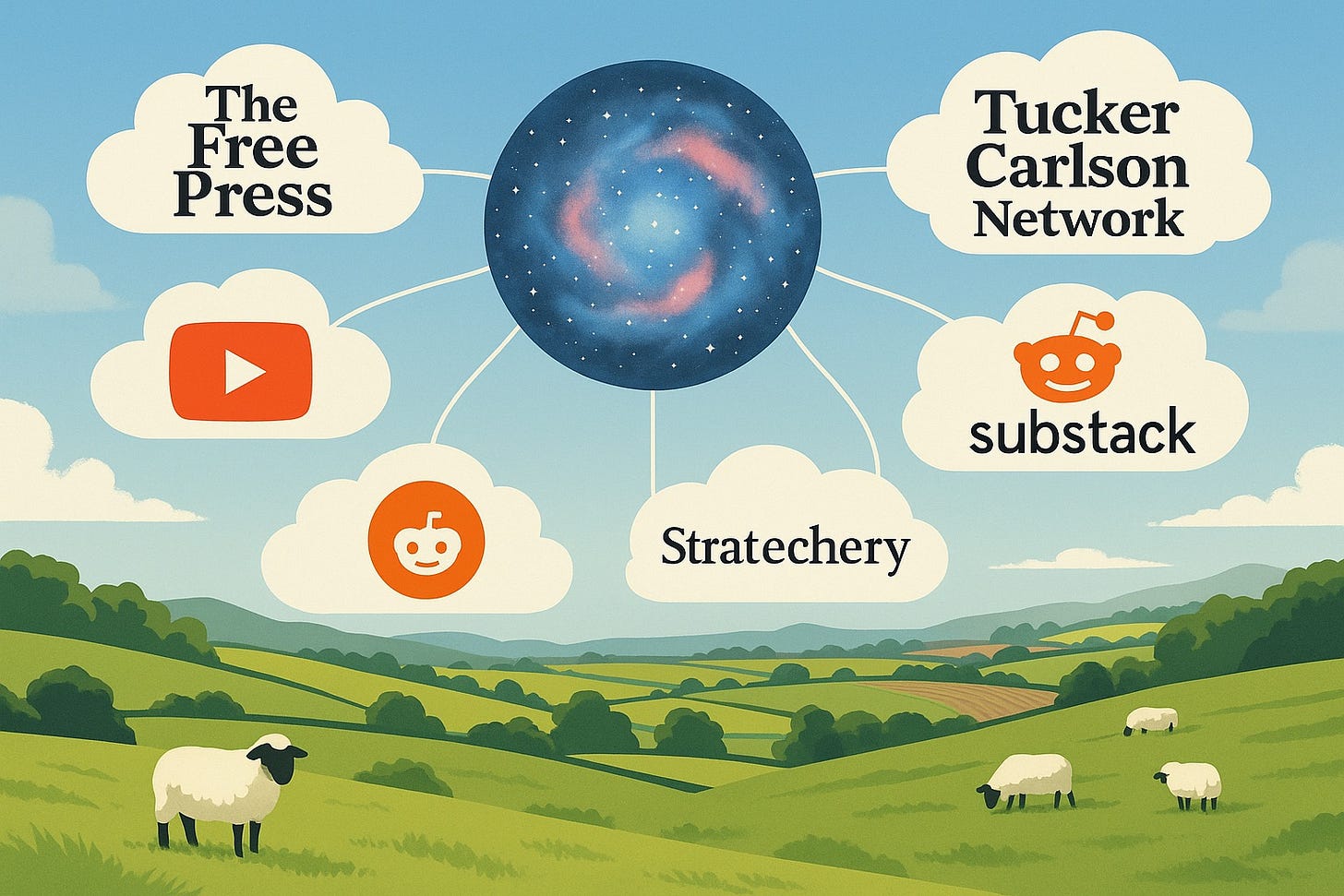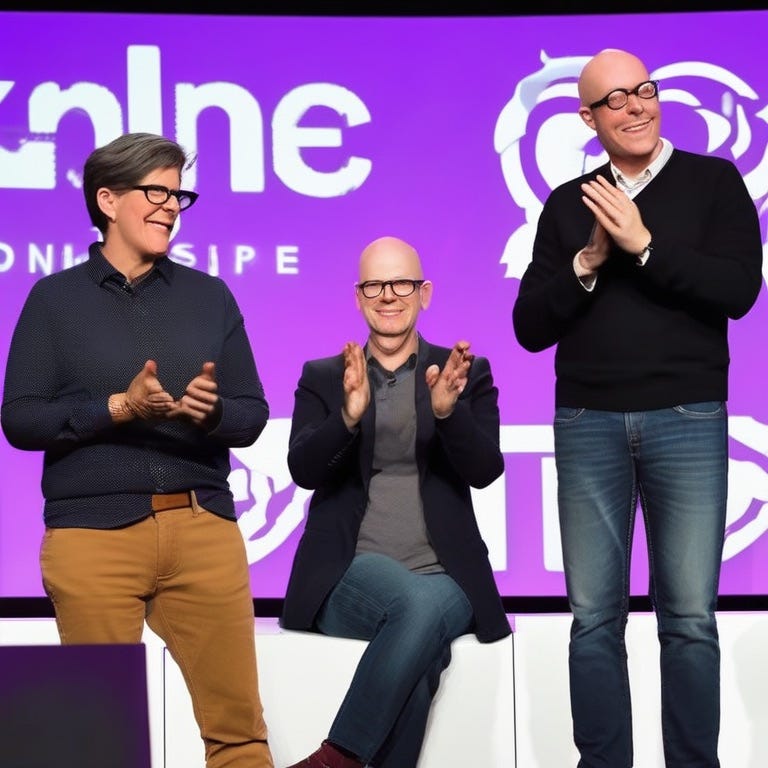The Media Mutiny: Inside Journalism's Wild New Celebrity Economy
From rooftop soirees in LA to understated offices in Taipei, individuals like Bari Weiss and Ben Thompson redefine the boundaries of media influence and celebrity status.
It’s a Thursday night in Los Angeles and Bari Weiss is holding court at a rooftop party in West Hollywood. The cocktails are strong, the donors are stronger, and the Substack star turned mogul has that electric grin — the one that says, I told you so . Two years ago she was a resigned-by letter martyr of The New York Times . Now she’s running The Free Press , a newsletter empire with venture capital sniffing around, and her guests — tech billionaires, podcasters, restless ex-reporters — orbit her like she’s already the next Murdoch. “People want the truth,” she says, raising a glass. What she doesn’t say: people really just want Bari.
Across the country in Silicon Valley, Ben Thompson is living the opposite fantasy. No rooftop parties, no photo ops — just a quiet office in Taipei and a newsletter calledStratechery. His words arrive in inboxes before sunrise California time, read by VCs in Patagonia vests and CEOs who pretend they “figured it out themselves.” Thompson is a monk of the media rebellion, a man who doesn’t need to tweet or rant. His power comes from the calm certainty that the smartest people in tech wait for his morning memo before making their own moves.
And then there’s Tucker Carlson, exiled from Fox News like a disgraced prince, now recording videos from a barn in Maine. The hair’s still perfect, the monologues still conspiratorial, but the set looks like a midwestern Cracker Barrel. Carlson laughs it off — because the audience followed. His clips still rack up millions, whether they air on X, YouTube, or Russian state TV. “You can’t cancel me,” he said in his first video after Fox canned him. He was right.
Welcome to the new media economy — a circus where the mastheads are shrinking, the institutions are wobbling, and the reporters themselves have become the show.
The Big Breakups
It used to be that legacy media was the brand and journalists were the supporting cast. The Times gave you credibility, CNN gave you visibility, BuzzFeed News gave you cool points. Now? Those brands are like nightclubs with sticky floors — still open, but everyone who matters has already left for the after-party.
Bari Weiss walked. Casey Newton walked. Kara Swisher didn’t even have to walk — she just made The New York Times her side hustle while running her own empire. Matt Belloni, Dylan Byers, and Julia Ioffe defected to launch Puck , a gossip-soaked insider sheet that feels like Vanity Fair drunk on Negronis.
It’s the same story everywhere: reporters ditching their cubicles, opening laptops, and becoming solo acts. Some make millions. Most don’t. But all of them are trying, because nobody wants to be the last one trapped in a newsroom with broken coffee machines and corporate memos about “synergy.”
The Party Crashers
Of course, not all the winners look like journalists.
Joe Rogan is still the heavyweight champ of the media rebellion. From his Austin compound, he records three-hour marathons with UFO nuts, scientists, comedians, and presidential candidates. Spotify paid him hundreds of millions, then cringed when he platformed conspiracy theorists. Didn’t matter: his fans are cult-loyal. Every guest wants the Rogan bump, every headline spins out of his podcast. He’s less a journalist than a gravitational force.
Reddit, meanwhile, became the accidental newsroom of the planet. r/WallStreetBets broke financial news. r/relationships provided endless content for lifestyle sections. r/politicsis the messy id of democracy itself. Journalists at legacy shops mine Reddit like unpaid interns — except the interns are anonymous weirdos with anime avatars. The IPO tried to corporatize it, but Reddit is still a mess of unpaid mods, tantrums, and blackouts. Chaos, yes. But indispensable chaos.
And then there’s MrBeast, the YouTube megastar who gives away Lamborghinis and islands for clicks. Not a journalist by any stretch, but his audience is bigger than CNN, Fox, and MSNBC combined. For anyone under 30, he is the media. That’s the real horror for legacy executives: the competition isn’t another paper. It’s a guy opening boxes of chocolate bars on TikTok.
The Graveyard Shift
For every Weiss or Rogan, there are dozens who didn’t make it. The Substack graveyard is littered with big names who left legacy jobs with fanfare and then fizzled. Glenn Greenwald, once the Snowden prophet, now railing to a shrinking base of paranoiacs. Roxane Gay, Anne Helen Petersen, Heather Havrilesky — all launched newsletters that died on the vine. Charlie Warzel fled the Times for Substack, then sheepishly retreated to The Atlantic .
Legacy giants are dropping like flies too. BuzzFeed News — Pulitzer in hand, no money in the bank — shuttered. Vice, once the bad-boy brand of gonzo journalism, ended up a bankruptcy garage sale. CNN+ burned $300 million in 30 days, a corporate tragedy so absurd it deserves a Broadway musical. The Washington Post is bleeding subscribers under Bezos’s distracted ownership, while The Los Angeles Times cuts staff like it’s running a layoff lottery.
Everywhere you look, the institutions that once defined media are staggering, and the personalities they housed are asking: why am I still here?
The Ego Economy
Kara Swisher knows the game. She’s been at it for decades, terrifying Silicon Valley CEOs with her barked questions and deadpan delivery. When she steps onstage at a conference, the billionaires shift in their seats. She doesn’t need The Times. The Times needs her.
Casey Newton is the opposite archetype: the obsessive grinder. His Platformer newsletter doesn’t scream, it just delivers scoop after scoop about Facebook, TikTok, and Elon Musk’s latest disaster. He’s not glamorous, but he’s steady — the kind of writer people rely on even if they don’t admit it publicly.
The new media economy runs on characters: Bari as the exile, Swisher as the bulldozer, Carlson as the martyr, Rogan as the gorilla, Thompson as the oracle, Newton as the grinder. Journalism itself has become the side hustle. What people are really paying for is access to the character .
The 2025 Media Power Index™
On Fire : Tucker Carlson, Joe Rogan, Bari Weiss, MrBeast, Puck, Reddit.
Holding Strong : Ben Thompson, Kara Swisher, Casey Newton, Pod Save America, NYT Games.
Slipping : Fox News, Washington Post, The Atlantic, MSNBC, LA Times, BuzzFeed.
Dead or Dying : CNN+, Vice, Gannett, Facebook News Tab, HuffPost, Substack casualties.
Wild Cards : Elon Musk, Spotify, Taylor Lorenz, Andrew Sullivan, Jon Stewart.
(Translation: the barn in Maine is hotter than Jeff Bezos’s entire newsroom.)
The Curtain Call
Here’s the cynical truth: audiences don’t care about journalism. They care about gossip. They want characters. They want to watch the Bari saga, the Tucker redemption arc, the Kara takedown, the Rogan circus. News is just the content pipeline for the drama of personalities.
Legacy media still has prestige, money, and Pulitzers. But it’s stuck running Wordle and cooking apps to keep subscribers. The independents? They’re messy, egotistical, often delusional — but at least they look like they’re having fun. And they have a new set of tools that combined can rival that of any corporate media tech.
The reboot isn’t about saving journalism. It’s about reinventing it as reality TV. And right now, the stars aren’t newspapers or networks. They’re the people who escaped them.
Keep up to date with The Letts Journal’s latest news stories and posts at our website and on twitter.





